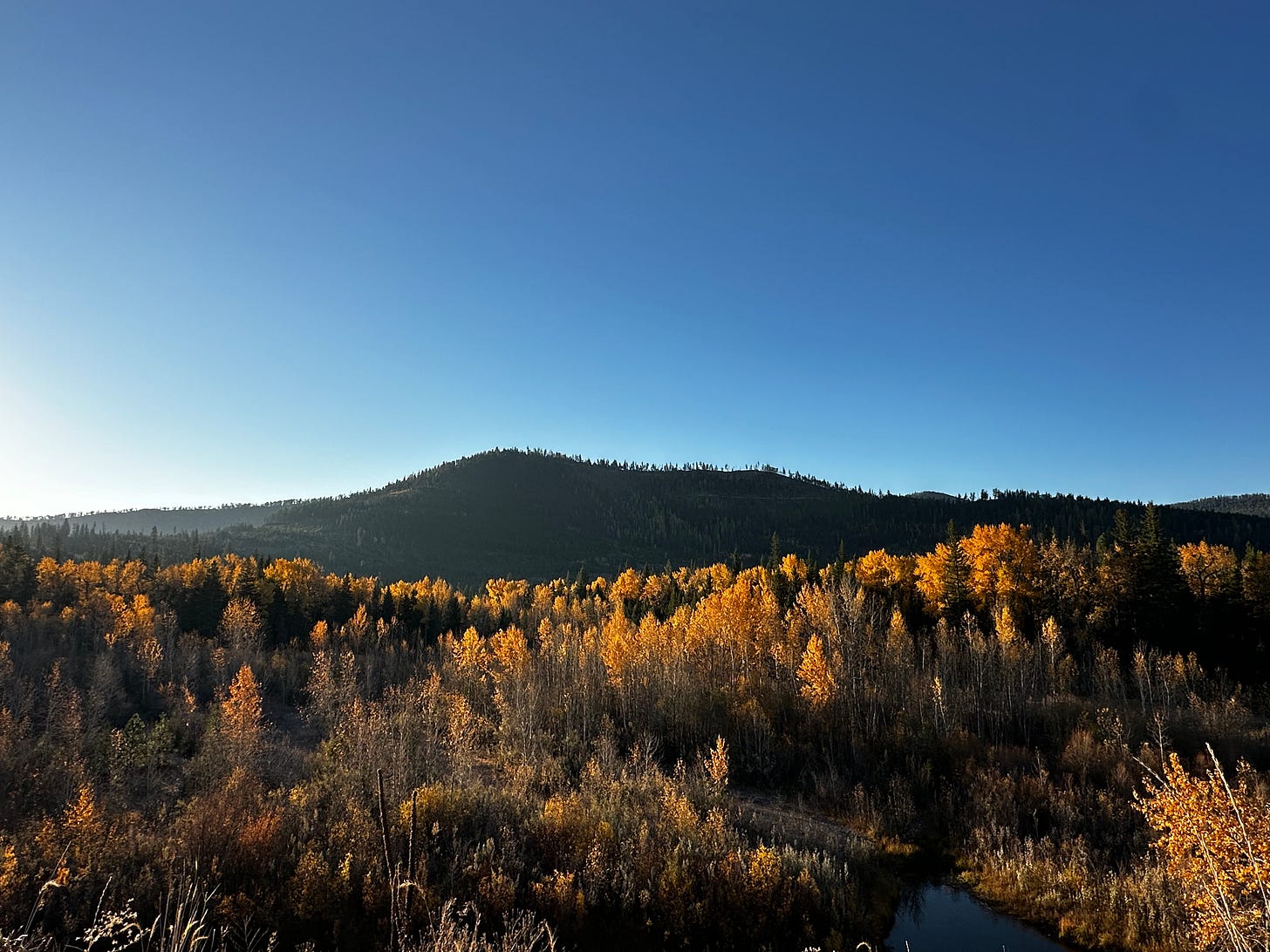46ºN
and northward into the ice
As someone who spent her childhood on the humid eastern seaboard, and whose family for a few generations hailed from even farther in the swampy South, I’ve always thought my heritage and traditions rose out of that boggy place, and sure…some did. I’ll eat the hell out of stewed turnip greens, for example. I love the land and its inhabitants, too: Lightning bugs swoop in J-shapes through the humid night. Magnolia trees tower with grace. Cicadas carry the heat of the afternoon on their wings.
Yet living nearly 30 years at 46ºN latitude has changed my perspective not only on the South, but on myself. I’m not just a Montanan, I’m a Northerner. And no wonder. All I have to do is turn back a handful of generations, maybe 200 years, and my ancestors start to call places like Antrim, Ireland, and Yorkshire, England, home. They lived even farther north than where I reside now. Turning a face into the cold wind, wrapping an extra wooly scarf around my neck, walking a distance through drizzle and slush is in my DNA.
The more I consider this, the more sense my habits make. For example, I sleep with the window open year-round. Last night the low hit 38º, I think, and when I woke my bedroom was a refrigerator and my bed the oven that keeps the bread warm overnight. Cats weigh down my bedding, which at four layers deep probably heats their bellies too.
I’ve been reading incessantly about the cold north. Right now I’m mid-Gretel Ehrlich’s This Cold Heaven and earlier this fall I read Wanderlust. Both describe life in Greenland, a land of ice, dogs, and no trees, where humans have made their homes for thousands of years. I am transported by these books to the impossible landscape. Dark and light become characters in a story of life near the Arctic Circle, as the earth spins in and out of seasons of utter sun and utter blackness.
I love to read anything related to the raw edge of boat travel, bitter cold, and the potential for starvation. I recently finished Disappointment River1 about Alexander MacKenzie’s search for the Northwest Passage, and absorbed the author’s descriptions of his own canoe trip tracing MacKenzie’s route. Astoria by Peter Stark describes much of the same kind of continental exploration/colonization/adventure/death. I enjoyed Beyond the Trees: A Journey Alone Across Canada where this young man undertook an insanely long solo canoe trip involving the most ridiculous portages through bogs and across boulders. I absolutely could not believe what he described doing. I swallowed whole Endurance by Alfred Lansing and followed that with Madhouse at the End of the Earth: The Belgica’s Journey into the Dark Antarctic Night which has one of the best titles ever written and is largely about scurvy, which if you know me, you know I’m obsessed with scurvy. And I’m leaving out several more titles here, because I believe I’ve made my point.
Aside from the books above which you’d find on the adventure shelf at the bookstore, I’ve also been learning universes about the voyageurs and fur traders by pulling from the Indigenous shelf. A life of tippy canoes on icy rivers and subsistence hunting does not appeal to me directly as I sit in my gas-heated living room, coffee scent wafting from the warm kitchen, but reading about it touches something primal, I think. These stories carry me on a journey backwards in time, spiraling through my DNA strands to ancestors whose life on the stormy beaches and interior peat-bogs of island-nations in the North Atlantic was defined by bracing headwinds and a cold, hard sun.
I’ve just returned from a trip across the Great Plains, approaching the vast northern woods to the east and the frigid waters of that wild place. Maybe I couldn’t live in Minnesota, but I think I understand the people of the north country. Our thin winter sun barely touching the snowy land used to nearly frighten me. Now I see it is part of the spare beauty of this place, and part of what lives inside us.
Well written, compelling, but I found his treatment of Indigenous people and topics tone-deaf and self-conscious, not in a good way.




The Quickening by Elizabeth Rush is a book I loved, set around a scientific antarctic expedition but contemplates themes like motherhood and climate change as well.
Hi-you have inspired me to find the time to read more this winter. I love reading about cold and dark adventures from the warmth of my couch ❤️ I put some of those books on my list!